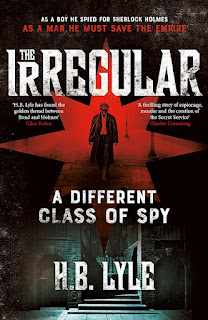The Irregular - H.B. Lyle
I said that counter-espionage was being taken seriously for the first time, but that is rather getting ahead of things. The work of Captain Vernon Kells in the newly formed Secret Intelligence Bureau is initially not being taken very seriously at all. No-one else in the government departments (with the exception of a certain Winston Churchill) really believes that British interests are at all threatened from the activities of Russian anarchists and German agent provocateurs, and Kell hasn’t yet been able to offer any credible evidence of a threat. Part of the reason for that is that he hasn’t really been given the right kind of agent. Fresh out of the best universities, his recruits don’t have the life experience, street skills or the ability to blend in and crucially not get themselves killed.
That’s where Wiggins comes in, the young man from the rough part of the East End, is recommended to Kells by a trustworthy authority, none other than Sherlock Holmes himself. Working as a bailiff for a debt collector and not particularly liking the nature of the work, Wiggins however is initially reluctant to work for a government department, but when a close friend of his on the police force is killed by what appears to be a robbery and murderous rampage by a group of Russian revolutionary anarchists, Wiggins does some probing himself in drinking dens that Kells’s agents would never get close to, and barely survives the experience himself. He is determined however to find out more about the group that work under the symbol of a six-pointed star, and Kells might have more resources to help him uncover the identity of their leader, Arlekin.
The Irregular is a good opening to a series that clearly has the intention of crossing over into a gritty TV period crime drama (Peaky Blinders, Penny Dreadful, Ripper Street, Taboo), so characterisation and context are important in this first book and they are brought out reasonably well. Wiggins’s early life as a street-smart orphan is covered, the young boy recruited by Sherlock Holmes to be his eyes and ears on the ground as part of his Baker Street Irregulars. It not only explains where Wiggins gained his street skills and deductive abilities, but it also throws a light on the background of life in London at the turn of the century; its brutality, poverty and the huge gulf between the rich and the working classes.
This is to be significant for the groundswell of not just crime, but the anarchy and revolution that is spreading on the continent with events building up to the Bolshevik revolution in Russia, and with the outbreak of the Great War. A new century and the rise of the Suffragette movement also hint at wider social changes in the air, and that is related back very nicely to Sherlock Holmes. The old methods of detective investigation are becoming obsolete, there is a new kind of crime and new methods and a less gentlemanly approach is required to effectively deal with it. All of which brings in the real-life emergence of the Secret Intelligence Bureau at this period in time, and the kind of adjustments needed in social attitudes and political manners to bring it about.
So far, so good, and the potential for further development and real-world context is there, but despite the period and the setting, The Irregular does tend to rely on a lot of stock characters and rather conventional pulp adventure exploits. It can’t resist making smug remarks about the future significance and foresight of Winston Churchill and the designation of the double-0 for agents in the newly formed secret service agency at the epilogue also feels rather tacky. On the other hand, if you love the idea of anarchists running around London with bombs trying to blow up the Tsar on a State Visit, with lots of rough and tumble on East End streets, some romantic exploits with mysterious foreign ladies, and dangerous villains with secret identities and hidden agendas, then The Irregular works very nicely, getting in at the roots of the British intelligence agencies and it establishes the scene well for more of the same.
The Irregular by HB Lyle is published by Hodder & Stoughton




Comments
Post a Comment